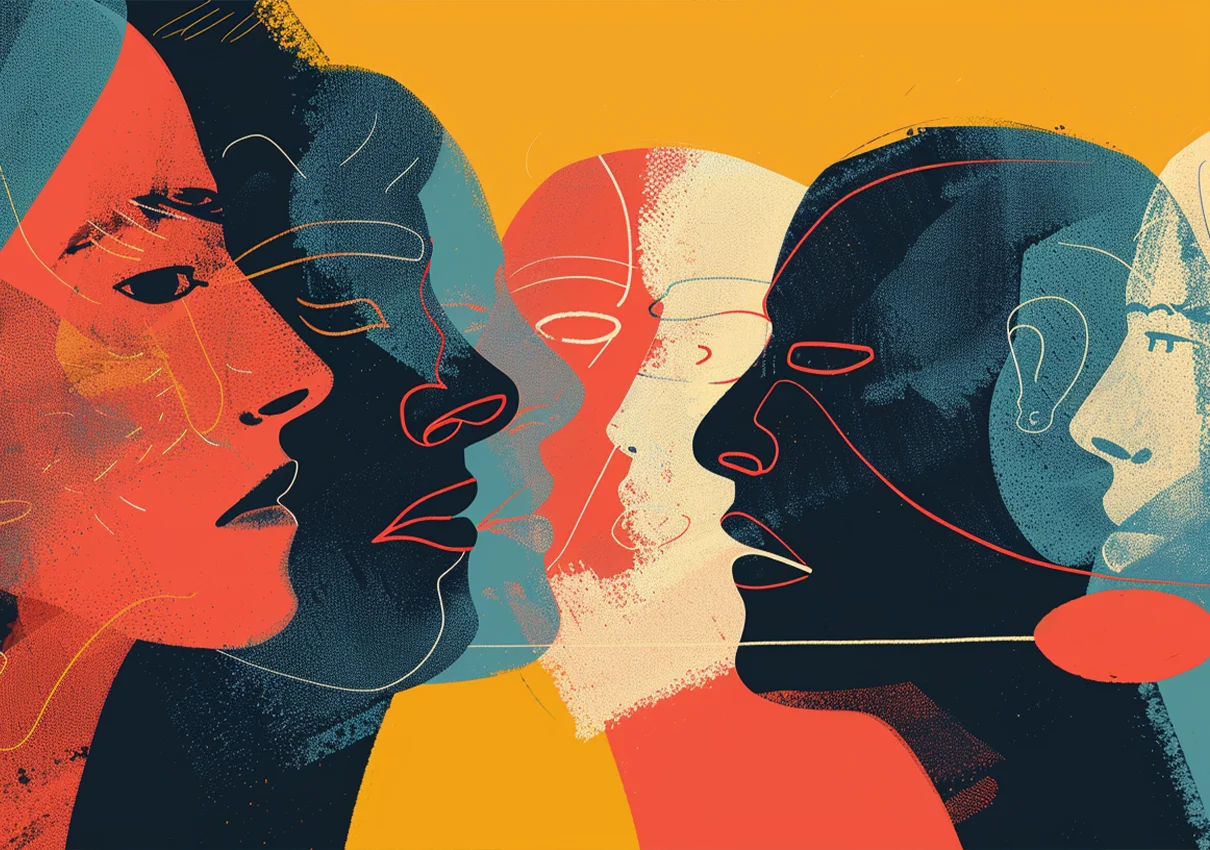To fully understand the emergence of social behaviours and pro-sociality, it is essential to recognise that these are fundamentally underpinned by cooperation and fairness, shaped by the co-evolution of biological and cultural influences. This interplay is crucial to the structure of society, contributing to trust and cohesion within organisations. Understanding the interaction between these evolutionary and social dynamics enables the design of more effective policies and interventions that align with cultural values, promoting sustainable cooperation and equity across various contexts. This co-evolutionary perspective is vital for achieving lasting success in organisational and environmental initiatives.
Introduction
The relationship between evolutionary dynamics and social behaviour has been a subject of sustained inquiry within the behavioural sciences and economics. At the heart of this research lies a pivotal question: How did pro-sociality – the propensity to act in the interest of others, often at personal expense – evolve, and what is its significance for contemporary society? This line of inquiry extends beyond theoretical interest, bearing profound implications for applied behavioural science, particularly in the context of organisational development and change management.
Pro-social behaviour, encompassing altruism, cooperation, and fairness, is integral to both social cohesion and the enhancement of decision making processes within organisations. Insights from various scholars have clarified the mechanisms by which pro-sociality is sustained and promoted within groups, providing critical insights for the design of interventions aimed at achieving equity and improving organisational dynamics, especially during periods of transformation.
The subsequent analysis synthesises these insights, applying the concept of co-evolution to illustrate the intertwined development of biological and cultural traits. By examining how pro-social behaviours co-evolve within organisational and environmental contexts, the discussion aims to inform the design of interventions that are aligned with these evolving dynamics. The following sections will explore theoretical foundations, practical applications, and actionable recommendations for integrating these insights into organisational development and environmental policy.
Cooperative Dynamics and Fairness as Foundation of Pro-Social Behaviour
Pro-social behaviour is deeply embedded in the evolutionary history of human societies, where the imperatives of cooperation and fairness have played a crucial role in survival. The concept of co-evolution elucidates how these behaviours are not solely biologically ingrained but are also reinforced through cultural transmission over time. Fehr and Schmidt (1999) demonstrated that pro-sociality is often driven by intrinsic concerns for fairness and reciprocity, elements that have evolved to sustain cooperative behaviour in both natural and social environments.
The traditional economic model of homo economicus, which assumes purely self-interested behaviour, has been challenged by robust empirical evidence showing that social preferences, particularly those related to reciprocity and fairness, are critical determinants of human behaviour (Rabin, 1993; Dufwenberg and Kirchsteiger, 1999). Recognising these preferences is vital for understanding and influencing decision making processes within organisations.
The distinction between reciprocal fairness and inequity aversion, as outlined by Fehr and Schmidt (1999) and Bolton and Ockenfels (2000), provides a nuanced understanding of how fairness perceptions influence pro-social behaviour. In organisational settings, recognising this distinction can be crucial for designing interventions that effectively address employees’ concerns about equity and fairness.
Experimental paradigms such as the Ultimatum Game have consistently revealed a pronounced human preference for fairness, with individuals frequently rejecting unequal offers even when such rejections contravene their economic self-interest. This behaviour, which Gintis et al. (2003) suggest is rooted in evolutionary processes, underscores the role of social norms in guiding individual actions. Similarly, public goods games, wherein participants decide how much of their private resources to contribute to a collective pool, have demonstrated that cooperation is typically contingent upon expectations of reciprocity from others (Falk et al., 2002).
Armin Falk’s research has significantly shaped the understanding of reciprocity as a central mechanism in pro-social behaviour. His extensive work on the economics of reciprocity, particularly in collaboration with Fehr and Fischbacher, has provided critical insights into how reciprocal actions underpin social cohesion and cooperation. Falk et al. (2005) articulate the dynamics of reciprocity, demonstrating that individuals are motivated by fairness concerns and are willing to engage in costly punishment to uphold social norms.
Falk’s contributions extend beyond experimental economics, offering a deeper theoretical framework for understanding how reciprocal behaviour emerges and is sustained within human societies. In his studies, Falk examines the psychological underpinnings of reciprocity, exploring how individuals’ social preferences are shaped by expectations of reciprocity and fairness. This work has emphasised the importance of reciprocal fairness, where individuals not only respond to the actions of others but also consider the intentions behind those actions. For instance, Falk and Fischbacher (2006) argue that reciprocity is not merely a reaction to outcomes but is deeply influenced by perceived intentions, making it a more complex and integral aspect of human social behaviour.
This line of research also investigates the broader implications of reciprocity for social and economic interactions. By examining how reciprocal behaviour influences market outcomes, trust, and social capital, Falk has provided a comprehensive understanding of the role of reciprocity in economic theory. His findings suggest that reciprocity is a fundamental driver of cooperation, influencing everything from contract enforcement to the establishment of social norms within communities. This perspective has significantly shaped the debate on the origins of pro-social behaviour, highlighting reciprocity as a key factor in the evolution of cooperative societies.
Furthermore, his work has practical implications for policy design and organisational management. By demonstrating that reciprocal behaviour can be harnessed to encourage pro-social outcomes, the findings suggests that policies and interventions that emphasise fairness and reciprocity are more likely to succeed in promoting cooperation and collective action. This has important ramifications for the design of environmental policies, organisational change strategies, and community-based initiatives, where establishing a culture of reciprocity can lead to more sustainable and equitable outcomes.
Strong Reciprocity and Altruistic Punishment
Reciprocity, particularly in its strong form, plays a critical role in promoting cooperation and enforcing social norms within groups. The concept of strong reciprocity is distinct from simple altruism, as it involves conditional cooperation – individuals are willing to cooperate if they believe others will do the same, and they are also prepared to punish those who defect.
Strong reciprocity, as described by Fehr and Fischbacher (2002), is essential in promoting cooperation within social dilemmas. Unlike altruism, which is unconditional, strong reciprocity involves conditional cooperation, where individuals are willing to cooperate if others do as well. This principle can be strategically employed in organisational change management to cultivate a culture of mutual support and accountability.
Falk’s et al. (2005) work on the driving forces behind informal sanctions provides a detailed analysis of how reciprocity functions in real-world settings. Their findings indicate that individuals engage in costly punishment not only to enforce social norms but also as a response to perceived unfairness, reinforcing the importance of reciprocity in sustaining cooperation. Additionally, Falk and Fischbacher (2006) further elaborate on how expectations shape reciprocal behaviour, demonstrating that reciprocity is deeply embedded in social interactions and is crucial for the maintenance of cooperative relationships.
Altruistic punishment, a concept explored by Fehr et al. (2002), underscores the role of punishment in enforcing social norms and enhancing cooperation. This theoretical foundation is not only of academic interest but also holds significant implications for practical applications. In organisational contexts, implementing clear and fair disciplinary measures can strengthen adherence to collective norms and promote a more cooperative and harmonious work environment. In addition, systems that reward cooperation while discouraging defection through transparent disciplinary measures can create environments where trust and cooperation are prevalent.
Henrich’s (2004) work further enriches this discussion by examining how cultural evolution shapes these reciprocal behaviours across different societies. Henrich’s et al. (2004) cross-cultural studies have shown that the evolution of institutions and social norms that support cooperation varies significantly between cultures, underscoring the necessity of considering cultural factors when examining the emergence and persistence of strong reciprocity.
The interplay between these theories highlights the co-evolution of biological predispositions and cultural norms that promote fairness and reciprocity. A nuanced understanding of these dynamics enables policymakers and organisational leaders to design interventions that not only promote pro-social behaviour but are also aligned with the evolutionary and cultural context of the populations they target.
Co-Evolutionary Dynamics and Pro-Sociality in Organisational Behaviour and Environmental Policy
A thorough understanding of the co-evolutionary dynamics of pro-social behaviour is indispensable for developing effective interventions within both organisational and environmental contexts. Enhancing pro-sociality within organisational behaviour can significantly improve cooperation, trust, and overall cultural cohesion, particularly during periods of transformative change. Fehr and Gächter (2000) have shown that organisations which embrace principles of fairness and reciprocity are more likely to achieve long-term success.
A pertinent example of co-evolution in practice is observed in Siemens AG’s implementation of a comprehensive change management strategy during its digital transformation. Recognising that technological advancements alone were insufficient, Siemens strategically evolved its organisational culture to support this transition. By actively engaging employees in decision making processes and cultivating a culture of innovation and cooperation, Siemens successfully aligned its technological progress with a supportive internal environment. This approach exemplifies the co-evolutionary perspective, wherein cultural and technological developments must proceed in tandem to ensure successful organisational change.
In the realm of environmental policy, the concept of co-evolution offers valuable insights for designing interventions aimed at promoting sustainable behaviour. The “Grüner Punkt” (Green Dot) system in Germany, which incentivises companies to reduce packaging waste, operates on principles of reciprocity and collective responsibility. This policy not only mitigates environmental impact but also reinforces a cultural norm of sustainability among businesses. The success of the Green Dot system underscores the efficacy of policies that align with cultural values and social norms in achieving long-term environmental objectives.
Similarly, the German “Energiewende” (energy transition) exemplifies the importance of co-evolution in policy design. At the local level, cities like Freiburg have effectively integrated renewable energy initiatives into their broader cultural and social frameworks. By encouraging a sense of collective responsibility and mutual benefit, these initiatives have not only enhanced energy efficiency but have also strengthened the community’s commitment to sustainability. This case demonstrates how the co-evolution of social norms and policy initiatives can drive significant progress in environmental sustainability.
Implications for Intervention Design
The insights derived from the study of reciprocity and its role in pro-social behaviour provide valuable guidance for the design of interventions aimed at encouraging pro-social and environmentally sustainable behaviour. Interventions that leverage social image and reputational incentives have been shown to be particularly effective in encouraging sustainable practices.
For instance, Tirole and Bénabou’s (2006) research suggests that community-based environmental programmes that publicly acknowledge and reward pro-environmental behaviours can effectively tap into individuals’ desire for social recognition, thereby motivating sustained behavioural change. These programmes are designed to cultivate a culture where environmental stewardship is regarded not only as a personal virtue but also as a socially rewarded behaviour. This approach aligns with research findings that highlight the significant role of social image in motivating individuals to act in ways that benefit the collective.
Moreover, by integrating the concept of strong reciprocity into these interventions, policymakers can design programmes that incentivise pro-social behaviour while simultaneously establishing social norms that discourage defection and promote collective responsibility. This dual approach is particularly effective in addressing environmental challenges, where collective action is essential for achieving long-term sustainability goals.
Actionable Recommendations
The examination of co-evolution and social behaviour offers profound insights into the mechanisms that drive pro-sociality, cooperation, and reciprocity. These insights, grounded in rigorous scientific research and evolutionary theory, have significant implications for both organisational behaviour and environmental policy. By understanding and leveraging the context-dependent nature of co-evolution, interventions can be designed that not only encourage cooperation but also contribute to broader social and environmental goals.
To translate these insights into practice, consider the following actionable recommendations:
- Leverage Co-Evolution for Organisational Change:Recognise that technological advancements and cultural shifts must evolve in tandem. Implement feedback mechanisms that regularly assess and adapt organisational culture in response to external changes, ensuring that the organisation remains agile and aligned with evolving market demands.
- Embed Fairness and Reciprocity in Corporate Practices:Develop a culture of fairness by embedding principles of reciprocity into everyday business operations. This can be achieved through transparent decision making processes and the creation of accountability systems that empower employees at all levels to participate and contribute, thereby enhancing cooperation and trust.
- Design Policies That Align with Cultural Norms:When developing environmental or organisational policies, ensure that they resonate with existing cultural values while also promoting new, sustainable behaviours. Policies such as Germany’s “Grüner Punkt” system have succeeded because they align with broader societal norms of collective responsibility and environmental stewardship.
- Invest in Strong Reciprocity for Sustainable Success:Encourage pro-social behaviour within your organisation by cultivating a culture of strong reciprocity. This means not only rewarding cooperative behaviour but also establishing clear consequences for actions that undermine group cohesion. By doing so, you create an environment where trust and cooperation are the norm, leading to long-term organisational success.
Conclusion
The study of co-evolution and social behaviour offers profound insights into the mechanisms that drive pro-sociality, cooperation, and reciprocity. These insights, grounded in rigorous scientific research and evolutionary theory, have significant implications for both organisational behaviour and environmental policy. By understanding and leveraging the context-dependent nature of co-evolution, interventions can be designed that not only encourage cooperation but also contribute to broader social and environmental goals.
The challenge, however, lies in translating these insights into practice. As the complexities of human behaviour and the intricacies of social dynamics are navigated, it is essential to remain adaptable, informed by the latest research, and sensitive to the specific contexts in which these interventions are implemented. Only by recognising the interconnected evolution of biological, cultural, and organisational systems can a more cooperative, fair, and sustainable world be created.
References
Bénabou, R., and J. Tirole (2006), Incentives and prosocial behaviour, American Economic Review, 96(5), 1652-1678.
Bolton, G. E., and A. Ockenfels (2000), ERC: A theory of equity, reciprocity, and competition, American Economic Review, 90(1), 166-193.
Bowles, S., and H. Gintis (2003), Origins of human cooperation, in: P. Hammerstein (Ed.), Genetic and Cultural Evolution of Cooperation, MIT Press, 429-443.
Bruni, L. and S. Zamagni (Eds.) (2008), Handbook on the Economics of Reciprocity and Social Enterprise, Edward Elgar Publishing
Charness, G., and M. Rabin (2002), Understanding social preferences with simple tests, Quarterly Journal of Economics, 117(3), 817-869.
Dufwenberg, M., and G. Kirchsteiger (1999), A theory of sequential reciprocity, Games and Economic Behavior, 47(2), 268-298.
Falk, A., E. Fehr, and U. Fischbacher (2001), Appropriating the commons: A theoretical explanation, CESifo Working Paper, No. 474, Center for Economic Studies and ifo Institute (CESifo), Munich
Falk, A., E. Fehr, and U. Fischbacher (2005), Driving forces behind informal sanctions, Econometrica, 73(6), 2017-2030.
Falk, A., and U. Fischbacher (2006), A theory of reciprocity, Games and Economic Behavior, 54(2), 293-315.
Fehr, E., and U. Fischbacher (2002), Why social preferences matter – The impact of non-selfish motives on competition, cooperation and incentives, Economic Journal, 112(478), C1-C33.
Fehr, E., and U. Fischbacher (2006), The nature of human altruism, Nature, 425(6960), 785-791.
Fehr, E., and S. Gächter (2000a), Cooperation and punishment in public goods experiments, American Economic Review, 90(4), 980-994.
Fehr, E., and S. Gächter (2000b), Fairness and retaliation: The economics of reciprocity, Journal of Economic Perspectives, 14(3), 159-181.
Fehr, E., and S. Gächter (2000c), Altruistic punishment in humans, Nature, 415(6868), 137-140.
Gintis, H. (2000), Strong reciprocity and human sociality, Journal of Theoretical Biology, 206(2), 169-179.
Gintis, H., S. Bowles, R. Boyd, and E. Fehr (2003), Explaining altruistic behaviour in humans, Evolution and Human Behavior, 24(3), 153-172.
Henrich, J. (2004), Cultural group selection, coevolutionary processes and large-scale cooperation, Journal of Economic Behavior & Organization, 53(1), 3-35.
Henrich, J., and R. McElreath (2003), The evolution of cultural evolution, Evolutionary Anthropology: Issues, News, and Reviews, 12(3), 123-135.
Henrich, J., R. Boyd, S. Bowles, C. Camerer, E. Fehr, and H. Gintis (Eds.) (2004), Foundations of Human Sociality: Economic Experiments and Ethnographic Evidence from Fifteen Small-Scale Societies, Oxford: Oxford University Press
Henrich, J., S. J. Heine, and A. Norenzayan (2010), The weirdest people in the world?, Behavioral and Brain Sciences, 33(2-3), 61-83.
Henrich, J., and F. J. Gil-White (2001), The evolution of prestige: Freely conferred deference as a mechanism for enhancing the benefits of cultural transmission, Evolution and Human Behavior, 22(3), 165-196.
Laland, K. N., J. Odling-Smee, and M. W. Feldman (2000), Niche construction, biological evolution, and cultural change, Behavioral and Brain Sciences, 23(1), 131-146.
Rabin, M. (1993), Incorporating fairness into game theory and economics, American Economic Review, 83(5), 1281-1302.
Rand, D. G., A. Dreber, T. Ellingsen, D. Fudenberg, and M. A. Nowak (2009), Positive interactions promote public cooperation, Science, 325(5945), 1272-1275.
Richerson, P. J., and R. Boyd (2005), Not by Genes Alone: How Culture Transformed Human Evolution, Chicago: University of Chicago Press



